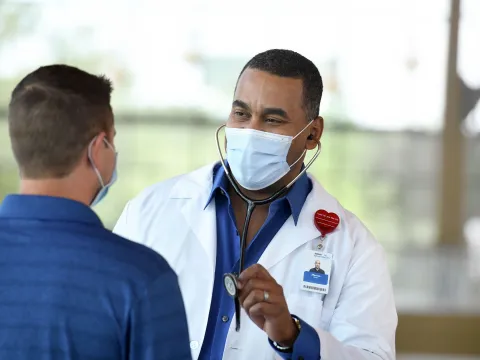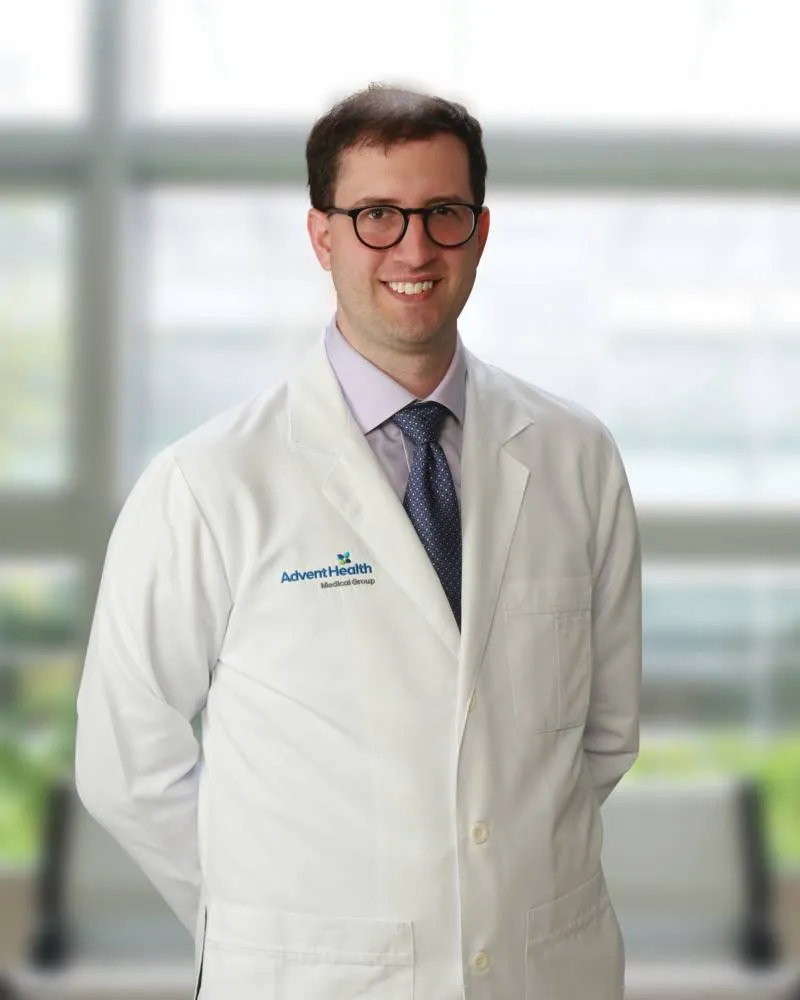- AdventHealth

Choose the health content that’s right for you, and get it delivered right in your inbox.
One of the leading causes of death in the United States, cardiac arrest can happen at any age. What makes it so dangerous is the sudden and drastic nature of its effects, requiring quick medical attention to survive. Though it's often believed to be the same thing as a heart attack, the two have key differences.
Being able to identify cardiac arrest risk factors and early signs in yourself and your loved ones could help you save a life. Here, we share what you need to know about this condition.
Cardiac Arrest vs. Heart Attack
Cardiac arrest occurs when the heart malfunctions and stops beating unexpectedly. It’s triggered by an electrical failure in the heart and causes an irregular heartbeat or arrhythmia. A person suffering from cardiac arrest may become unresponsive, is unable to breathe or is gasping for air. Symptoms include:
- Sudden collapse
- No pulse or breathing
- Loss of consciousness
Some people have a heart attack with a blocked artery which results in cardiac arrest. When there isn't adequate blood flow, rhythm problems occur and the heart stops.
Heart attacks are one cause of cardiac arrest, but causes can also be familial or genetic. Or even more rarely, incidental. For example, someone might take a hard blow to the chest which could cause their heart to stop.
Although these types of incidents do sometimes happen, heart attacks are the most common cause of cardiac arrest.
A heart attack occurs when blood flow to the heart is blocked. Unlike a cardiac arrest, heart attacks are a circulation or blood flow problem — the heart doesn’t actually stop. A blocked artery prevents blood from flowing freely to portions of the heart and if blood is not able to reach that area after a period of time, the heart muscle begins to die.
Symptoms of a heart attack include:
- Tightness, squeezing, pain or pressure in the chest/upper body (this feeling may go away and then come back)
- Shortness of breath
- Sweating/cold sweats
- Fatigue
- Trouble Sleeping
- Lightheadedness or dizziness
- Pain or discomfort in one or both arms, neck, jaw or stomach
- Nausea/vomiting
Most often, these symptoms will be subtle and may go undetected because they creep up slowly, sometimes lasting for days or even weeks before the attack. Many people brush off symptoms as the flu, stress, or simply feeling under the weather, but it’s best to seek help to be sure.
It's important to note that not all heart attacks will result in cardiac arrest, but those that do are far more serious. The heart attack survival rate is in the high 90 percent range, but people who experience cardiac arrest only have about a 50 percent survival rate.
Risk Factors
Cardiac arrest occurs in both children and adults, but much more commonly in adults. And there could be several contributing factors to future cardiac arrest.
Your age, structural problems with your heart, and the size of your heart can be contributing factors. For example, sometimes young children will have under-developed hearts or thick hearts that can lead to electrical problems.
If you have a large heart, you may also be predisposed to electrical arrhythmias that could eventually lead to cardiac arrest.
If you've already had a heart attack, you're also at a greater risk of cardiac arrest. If one of your arteries or vessels gets blocked off, it could damage the muscle and lead to arrhythmia.
Young people aren't exempt from risk. Although it's much less likely that they will suffer a heart attack because of a blocked artery that has built-up plaque, there are other causes such as:
- Undiagnosed cardiomyopathy or hypertrophic cardiomyopathy that can predispose a person to an enlarged heart or a thickening of the tissue that could lead to a sudden heart attack,
- Congenital abnormalities of the arteries, where the arteries are not hooked up correctly and can compress and lead to sudden death, or
- Undiagnosed arrhythmogenic issues where there is an electrical issue in the heart that was unknown that could have led to a sudden heart attack and death.
The best way to stay safe is to stay on top of your routine checkups and blood pressure to get ahead of a potential arrhythmia. If a parent experiences a heart issue in his or her life, genetic tests can also be performed on any children to ensure their risk factors are caught early.
Don’t Hesitate to Seek Help
Catching symptoms early is key to avoiding what might become deadly cardiac arrest.
The earliest things to look for might be things you can’t necessarily see or feel, like hypertension and diabetes, but also weight and previous health history. It's important to get your checkups, your bloodwork, your blood pressure done to look for any signs. If you control the risk factors, your outcome is much better.
If you suspect you or a loved one are having a heart attack or cardiac arrest, call 911. It’s best to call for emergency help than to risk underestimating your symptoms.
Expert Cardiac Care Close to Home
Cardiothoracic surgeon Dr. Andrew Everett has joined AdventHealth Medical Group Cardiovascular and Thoracic Surgery at Daytona Beach. Andrew Everett, MD, specializes in cardiac surgery, thoracic surgery, coronary artery bypass surgery, aortic aneurysm repair, heart valve replacement and repair, and cardiac ablation.
Dr. Everett is a highly experienced cardiothoracic surgeon who earned his medical degree from the Geisel School of Medicine at Dartmouth in Hanover, New Hampshire. He completed his integrated residency and fellowship in cardiothoracic surgery at the Cleveland Clinic in Cleveland, Ohio, where he has worked since 2022 as a clinical associate surgeon. He is the author of numerous papers published in peer-reviewed publications and has given several presentations at professional events in the United States and Canada.
His practice accepts most insurance plans and new patients ages 18 and older. His office location is located at 305 Memorial Medical Parkway, Suite 300 Daytona Beach, FL. To contact his office, call Call386-231-3600.
Learn more about Andrew Everett, MD at AdventHealth.




